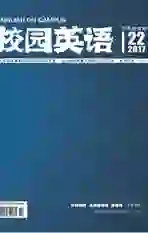Translation Appreciation and Criticism of Fengqiaoyebo
2017-08-04邹粟
【Abstract】Nowadays, some people argue that poems are untranslatable for the deep cultural meaning and rhyme. To some extent, poem translation is a kind of re-creation. This paper takes Fengqiaoyebos version by Bynner as an example to show its merits and demerits. Actually, poem translation poses great challenges under the situation of multiculturalism.
【Key words】poem translation; Fengqiaoyebo; extrinsic study; intrinsic study
Introduction to the Author and Poem
Zhang Ji (712 AD—779 AD) is a Chinese poet born in Xiangyang during the Tang Dynasty. Zhang is famous for passing the examination in 753 AD. According to the history, this poetry was written by Zhang Ji when he got Jinshi. Unfortunately, Emperor Xuanzong of the Tang Dynasty ran to Shu State after Anshi chaos in 776 AD. For the stable political situation in Jiangnan, many people fled to Jiangsu province and Zhejiang province to avoid chaos, including Zhang Ji. A fall of night, Zhang Ji docked his ship in Maple Bridge. He, with misery and travel worries in his heart, was attracted by the beautiful scenery in Suzhou. Other poets speak highly of Zhang for his excellent work by using vivid words to express sorrow. Fengqiaoyebo has become the representative work of him.
Intrinsic Study of Source Text
Source text:
楓桥夜泊
张继
月落乌啼霜满天,江枫渔火对愁眠。
姑苏城外寒山寺,夜半钟声到客船。
This poetry presents a misery situation along the river to show Zhangs worry about himself and country by using archaic expression. The first two lines are full with imageries. For example, “月落、乌啼、霜、江枫、渔火、不眠人”. These imageries show dark and cold scenery along the river. The last two lines only use “城、寺、船、钟声”to describe a unrestrained scene. The scenery and the authors emotion harmoniously combined, making the sorrow deep. The author uses allusion “寒山寺” presents a religious feeling and quaint solemn. Simple and vivid nouns were used in the poetry to make it accessible to readers. The author used enclosing rhyme (AABA) to make it catchy. The use of personification in “江枫” and “渔火” and hyperbole in “霜满天”to show deep sadness, making the language vivid and lively.
Intrinsic Study of Translated Text
Translated Text:
A Night Mooring Near Maple Bridget
Bynner
While I watch the moon go down, a crow caws through the frost;
Under the shadows of maple-trees a fisherman moves with his torch;
And I hear from beyond Suzhou from the temple on Cold Mountain,
Ringing for me here in my boat the midnight bell.
“Moon”, “crow” “maple-trees”, “Cold Mountain”, “midnight bell” show the reader a picture of quietness and sadness, presenting sorrow emotion of author. This poetry used simple words to make it easy to remember. “Crow caws” use alliteration, adding aesthetic tonality of line. For the third sentence, the author also adds subject “fisherman moves with his torch” to express “渔火”. Is that really a torch or oil lamp? Unfortunately, this translated text belongs to free verse for no rhyme.
Comparison of Source Text and Translated Text
Comparison of source text and translated text will focus on the merits and demerits. For merits, the theme of source text is truly reflected in translated text. For example, there is only one crow in translated text. We have no idea about the number of crows, but the singular makes the scenery quieter. “Moon”, “crow” “maple-trees”, “Cold Mountain”, “midnight bell” present misery scenery. The linguistic features in source text are faithfully reproduced in translated text. Author and translator use simple and vivid words to make readers understand easily. For demerits, the translators didnt do well in following aspects. Line patterns in source text are not preserved in translated text. Author uses AABA, known as enclosing rhyme, to make the poetry catchy. Instead of using enclosing rhyme, translator has no rhyme, so it belongs to free verse. Artistic skills in source text are not preserved in translated text. For example, the personification of “江楓渔火对愁眠” was omitted by the translator. Instead of translating emotion, the translator only faithfully translated imageries by using equivalent words in English.
Poetry is universally regarded as the most difficult genre to be translated, so much so that Robert Frost sighed, “Poetry is what gets lost in translation.”Translators are supposed to focus more on poem characteristics to present better visions.
References:
[1]肖志清.《枫桥夜泊》的模糊性及其多译本现象探究——基于文学符号学的重新阐释[J].长春理工大学学报(社会科学版),2008,(02):107-111.
[2]徐炳富.《枫桥夜泊》二十英译本的阐释学研究[D].苏州大学,2010.
作者简介:邹粟(1996-),女,四川泸州人,西华师范大学外国语学院翻译专业2014级本科在读。
